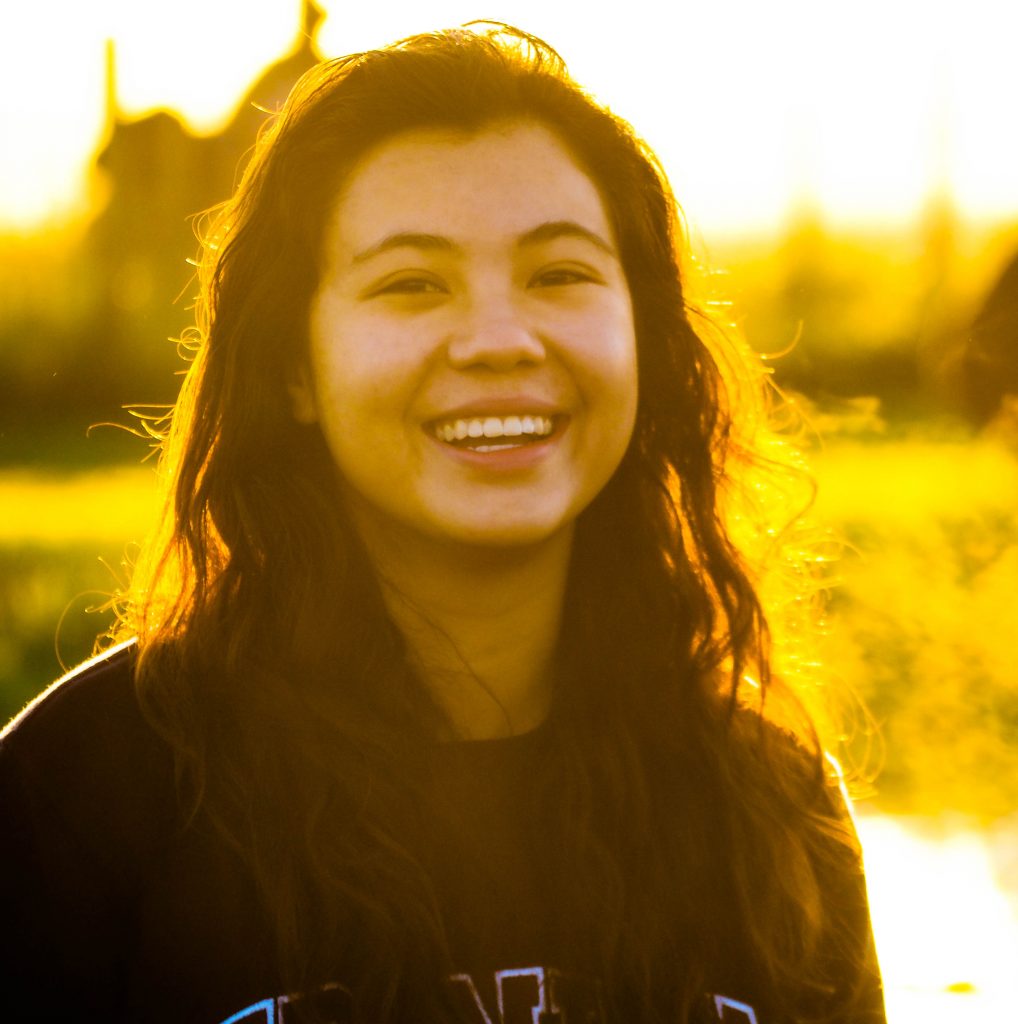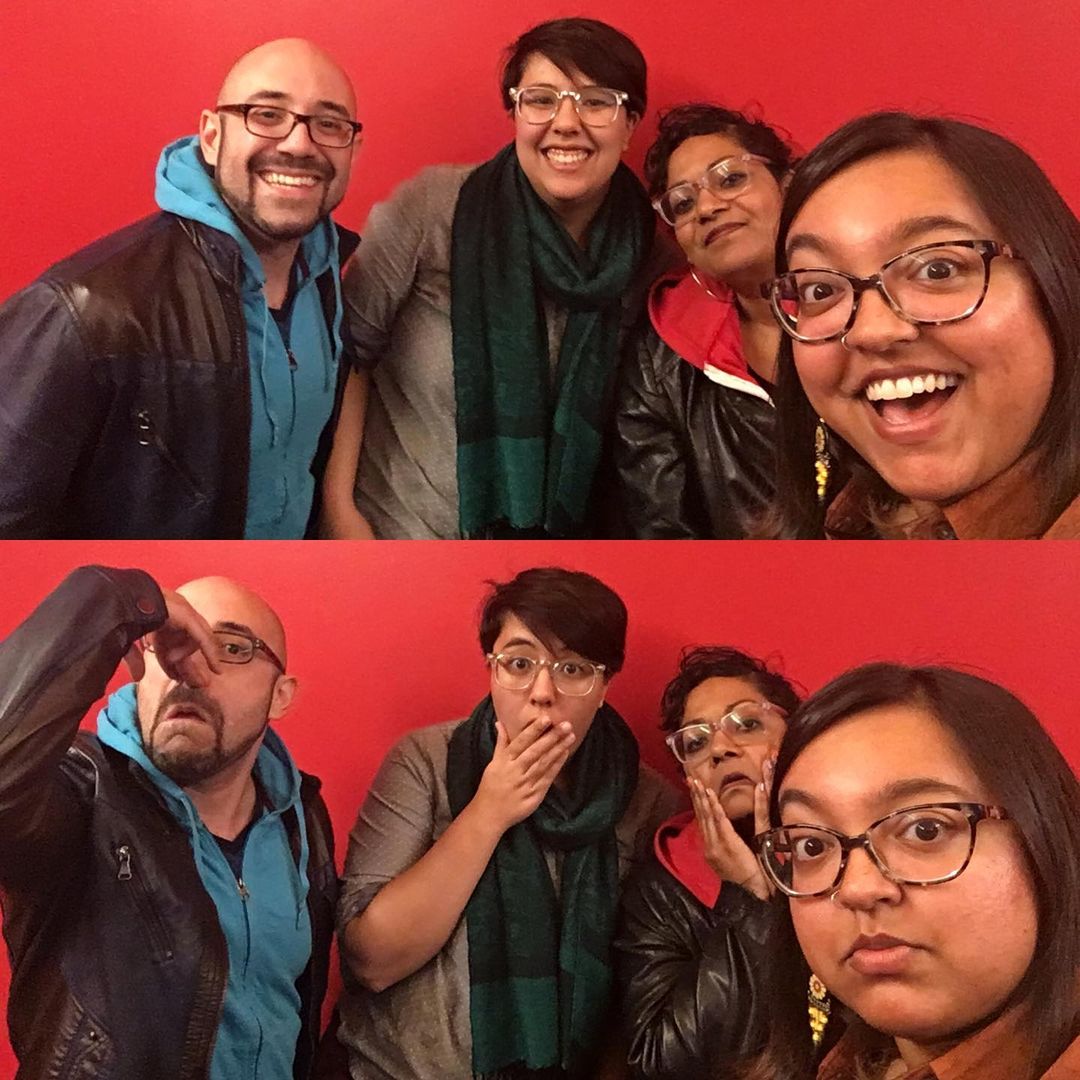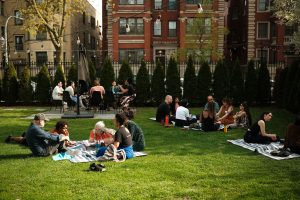BIPOC Playwrights is a new Chicago-based group bringing together writers and artists as an abolitionist, anti-racist, and anti-colonial collective. Founded at the end of 2019, the group flourished during the pandemic, drawing creators from all over into a digital space based in community care and building toward collective liberation. Drawing from its community agreements, BIPOC Playwrights commits to the following:
“We see that so much of the way theatre is made depends on exploitation of labor, furthering and profiting from oppression, and denying creative agency to artists with marginalized identities. We take the intimacy of theatrical work seriously, and we see the special role theatre and art as a whole play in creating new understandings (new knowledge) and new possibilities. We strive both as artists and as people carrying specific histories of oppression, and people carrying generations of trauma to reimagine what is possible in all of the work that we do. We hold that there are multiple truths in our general discussions, or artistic processes, and in our communities. We reject the idea that competition and scarcity can drive artists to liberatory or sustainable places.”
The BIPOC Playwrights core team consists of Liz Haas, Monique Rooker, Dominique Chestand, Lingyue, Tanuja Jagernauth, and Elon Sloan. I had the opportunity to (digitally) sit down with Elon and Tanuja to speak with them about the group and its evolution, the process of creating a space that combats white supremacy culture in theater, and existing and thriving together as BIPOC artists.
This interview has been edited and condensed for clarity
Olivia Popp (OP): I would love it if you could start by telling me a little bit about yourself.
Elon Sloan (ES): I went to college at DePaul — I studied playwriting originally. That was still my focus, even though my degree eventually broadened to theater studies. I was also a gender studies student. I thought a lot about the intersections between being a person of color and being an artist and the paths that are created for different art forms. For a long time, I focused on being outside of art, like building facilitation skills and sort of seeing that as another path and skill of being able to think in terms of time and emotional space. I was a sex ed facilitator with ICAH (Illinois Caucus for Adolescent Health) and I did a lot of facilitating for LGBTQIA+ students. I was constantly trying to look for new kinds of artistic opportunities where I could see a space to talk about social justice and histories of oppression and understanding those frameworks — and where I could also talk about my own experience through that lens, but also have an artistic lens. I’ve always tried to pursue, throughout my career, spaces where I can be a little bit of an organizer, a little bit of an artist, and a little bit of an educator at the same time.
Tanuja Jagernauth (TJ): I came to theater as a 37-year-old with no theater degree or background, but I had always wanted to do theater, even as a child. I think I had seen Peter Pan — it was some community production at some super tiny theater in Peoria, Arizona, where I was raised, and it blew my mind. I think the fact that it was cast with young people who were doing magical, beautiful things was just so compelling to me. I come from an immigrant family — I was born in Guyana, South America. When I told my mom, “I want to go to that playhouse that’s on that Cactus Avenue, and I want to do things!” The bewilderment — “No one makes it in acting.” I was not encouraged to do arts, so I was like, “Okay, fine. I’ll do everything else!” However, I’ve always been a writer, and, long story short, in 2015, after the death of my best friend and after attending the Voices of Our Nations Arts writing workshop for people of color, it just kind of hit me. You know what? Life is short. I am not unique or special in any kind of way that I can somehow trick mortality. Stop fucking around, basically, and if there’s something that you want to do, you really, really need to go do it. And so I closed the health collective that I co-founded, Sage Community Health Collective. No backup plan or savings or a safety net, really. I asked Chicago Dramatists if they had any internships available. I spent three months with them as an unpaid intern, and thanks to arts administrative job turnover, a spot opened up. They needed to fill it and they’re like, “Would you be down to work for us part time?” Having no job, I was like, “I’ll take the job.” Especially because the job came with the perk of free classes so I was like, “Hell yeah, free playwriting education.” And so I kind of thought about it as my DIY MFA.
OP: How did BIPOC Playwrights emerge from there?
TJ: One of the things that I really enjoyed at Chicago Dramatists was this writing group that they had created. It was sort of like this beautiful machine for me because I would take classes, and I would go to the writing group on Tuesdays, and I felt motivated to write because I had a container where I could bring my pages to be heard. I built up relationships with people in the group, and it just became a beautiful thing that I got to do for a couple years, maybe a year and a half. But I learned a lot. We had a lot of really good guests from the industry. In 2019, when a few of us got together to create BIPOC Playwrights, we wanted to create a space as a multi-genre workshop for playwrights of color, for writers of color, and the best of the writing group without the burden of the external white gaze. [We asked], what’s a space that we can claim where we can support one another, hear one another’s work, and really create a space where you can organize, educate, and create?
OP: How would you describe the evolution of the group from its inception?
ES: I feel like the group changed a lot just by continuing to exist. When it was in its first stages, it was really just a writing group. Over time, what we wanted to do became more specific, and we started to have all of these goals. We realized we had to do a bit more to reach them.
TJ: To be honest, it was pretty stunning how quickly it felt like we gained interest when the pandemic started. We were always small, and for me, I have no expectations of being a huge group that’s like tons of participants coming all the time because I truly believe in slow, steady, sustainable growth. Either the end of 2019 or the very beginning of 2020, a few of us met at a small coffee shop and talked about refining our mission, and it was three people. And, you know, we were like, “Okay, no problem, we can just take our time.” Someone worked at a literary nonprofit, so we got to use their space. They moved on, so then we were spaceless and we jumped around. Once the pandemic began and everything went remote, we also went remote, and meeting attendance increased, interest increased. And we said, “As we are growing in physical numbers, let’s finalize our mission. Let’s make sure we have really robust community agreements. Let’s make sure we have a grievance policy in place because as BIPOC folks coming out of theater, we hold trauma.” It’s such a sad reality that this is the given we have to hold if we’re trying to organize and create space for ourselves. Since last year, we’ve been thinking through these questions. How do you not be just a writing group where people bring pages they have generated, but how do you support people to generate those pages? And then, what are the critical conversations that we could be facilitating?
ES: We kept having meetings where people would bring a few pages, but the whole meeting wasn’t people sharing pages. We just started talking about things and talking about how people were doing in their careers, what people were wanting — were there other things we wanted to do with the group? The meetings of us just coming together as a writing group became planning meetings halfway through. And it’s really true what you said, Tanuja, about being a BIPOC artist of any kind. You come into this field with all of this passion and this desire to create something that’s really yours and to really challenge yourself and grow, but so many people have really awful, really traumatic experiences. I think that’s something that even recently, we’ve really had to grapple with. It is so common that racism is a problem and that hierarchies leading to abuse in the arts and in theater, especially, are so incredibly common. One of the first things that happened — Tanuja, you were like, “We really need to have a grievance process and a plan for what will happen if serious harm occurs in our space.” We all immediately agreed that we really needed to think about that. From there, we started thinking about other things: What other kinds of support do BIPOC playwrights, BIPOC writers, BIPOC artists need other than just a writing group? Then we started thinking about different kinds of spaces that we could provide.
OP: How would you like to see BIPOC grow—in any way—going forward?
ES: Right now we’ve made a lot of changes, so it’s time to just see how those things go and see how people respond, see what adjustments we need to make and make sure that everything is sustainable. I think that Tanuja is so good at reminding all of us that it’s really good to have long term aspirations, but don’t worry about achieving everything right now because there’s a lot to figure out. Things are still settling in an exciting way. We do have long term goals—we would eventually like to find more ways to support people and figure out more ways to have things shared with the public. I do know that we’re supposed to mention that we’re trying to have a website in the next few months.
TJ: We’re all volunteers. That, I think, is important to underline and, you know, my hope of hopes is that we don’t unwittingly recreate the structures that we are trying to create an alternative for. I think we have internal work to do, just as we have external work to do. That’s just built into the process of organizing and doing anything with anybody. But as individualistic as I can be and isolated as I have been very much in my life, I’m really trying to internalize this idea from Mariame Kaba that anything worth doing is done with others. That comes with everything that people bring, the necessity of making space for generative conflict, tough conversations, and moving at the pace of actual capacity. I am that auntie who shows up and is like, “Oh, cool! Cool idea! Great, awesome! And whose timeline are we on? We’re on our own timeline.” I love me a calendar. I love me a spreadsheet. But it’s a daily practice of mine to be checking in on the ways in which I have embodied some of these characteristics of white supremacy culture, because they’re in there. I grew up in Arizona. I went to graduate school for traditional East Asian medicine. I’ve spent lots of my life in institutions that are rooted in white supremacy culture, so any checking that I’m doing of other people, I’m checking myself on that as well. All those characteristics like perfectionism, the sense of urgency — that’s the big one that I think can be really tricky and sticky. I’m referencing the article by Tema Okun, if you’re familiar with it.
ES: I really resonate with that. I grew up in Oak Park, which is a mostly white suburb and is a very liberal place. However, it’s also a place where people really don’t talk about racism. I was growing up as this young person who was really interested in theater and art in general. I was navigating all these art spaces and getting the same advice as all of my white peers, but I was also always aware of the ways that, as a queer person and non-binary person, there were just a million ways that I never quite felt like I was in a place to be in the same spaces as everyone else. There was no space for me to complete those thoughts or get the information about the history of how art is complicit in white supremacy culture and, really, all forms of oppression — how the ways that we think about being able to make money from art or just being able to be artists is very gated off. Now, I associate this group as a part of my own practice. I really think that the things you cultivate also cultivate you. We’re putting energy into a space where we’re purposefully trying to interrogate the role of art in white supremacy, in upholding gender oppression and queerphobia and transphobia and all of those things. I think all the time about how often art is used as an investment and things like that. As I got older, and I became more aware of history and the way that people think about things, it became harder to embrace the idea of being an artist because I felt both at the same time. I wasn’t sure that I wanted to be in line with a lot of the things that are being presented to me as art, but also, I just wasn’t able to do those things. I think that there’s something really beneficial, even if you’re not coming to our meetings, about being an artist and taking the time to ask yourself, “What does this mean and what am I complicit in?” Just like everybody is complicit in something. What do I really want for myself as a person, and how does that fit in what I want for myself as an artist?
OP: Your community agreements state that the group “is here to remake how theater and art are made.” How do you see this in practice?
ES: I think that came out of those discussions that we started having at the end of meetings. One thing we talked about a lot is the process of getting feedback from a group of people who don’t understand anything about your background or experiences and how damaging that can be and how much it hurts — not just to have people indirectly talk about you if you’re talking about your work, but then to try to act on that feedback and to lose sight on a project because you’re trying to create with feedback that ultimately never applied to the work. We need to give people space to think about these things. I don’t think that we’re saying that we have the best theater model and everybody should just do it, but we want to create spaces for people to think about what theater is. What are the other ways to make it? What are the ways that I can make theater specific to myself and my experiences? How can I make connections and get resources for that?
TJ: Just adding to that—not everybody will have the ability or the privilege to self-produce. How do you practice harm reduction inside the typical white supremacist, very toxic theater industry as it is? If we can kind of skill-share with each other and give each other tools that we bring into the rooms that we get into, that’s one type of strategy. Harm reduction is one thing. What are the community agreements that you can insist upon having in rooms that you are in? What are the grievance processes and policies that you can insist on having at theaters where you end up having a production? When you are the dramaturg on a project, what are some of the boundaries that you can set and things you can ask for so you are not becoming the catch-all for everything that the stage manager cannot do? I feel like we’re opening up a window for BIPOC artists to know the way that is presented to you as “the way” is just one way. You deserve to make the art that you’re trying to make and not be completely eradicated, harmed, serrated, or traumatized in the process. But when that happens, and it will, you’re not alone. You may have access through us to a space where you can combat some of the gaslighting that you’ve experienced and unpack the experiences you’re having. It can be really isolating to be a BIPOC artist, and if you are having productions or having opportunities, it can still be harmful and isolating. You can still feel very much in competition with other people, not in collaboration. I think the structure of how we organize also presents a potential alternative to the way theater is done. As messy and as somewhat complicated and “inefficient” as collective collaboration can be, I love what you said, Elon—that the things you cultivate, cultivate you. I really think that this collective process embodies what theater has the potential to do—to really allow everyone to experience transformation through collectivity.
ES: I think that specific language also speaks to our hope to get to a place where we don’t have to create art that is just responding to oppression—but that is informed by it. It can grow into a different kind of space where we can have our experiences held, where we don’t feel like we have to make a play that explains what racism is before we can talk about racism or create work that is defensive about who we are as an artist because we know that it’s going to be received in a certain way. I think it is also a little bit of a visionary, hopeful statement that we will get to a place where, even if oppression still exists, we can exist fully as artists.
Featured Image: An image of two selfie-style photos stacked on top of each other. Both feature the same four people standing in front of a red background. In the top photo, all four subjects are smiling for the camera; in the bottom photo, all are making funny faces. Standing on the leftmost side is a person wearing a black leather jacket with a blue hoodie underneath, they are bald, have a short boxed beard, and are wearing rectangular glasses. In the middle of the photo, is a person with short black hair and rounded glasses wearing a gray shirt and a long green scarf. Standing next to them is a person with rounded glasses and black hair tied back. They are wearing a black leather jacket with a red hoodie underneath. On the rightmost side of the photo, is the person closest to the camera. They have short dark brown hair, a nose ring, and rounded glasses and is wearing a tan/orange jacket. Photo by Anjali Misra.

Olivia Popp is a multiracial Taiwanese American writer and artist from the Midwest. She’s always on the lookout for recommendations on thriller TV shows, DIY coffee drinks, and new plays by writers of color. Find her on Twitter: @itsoliviapopp



